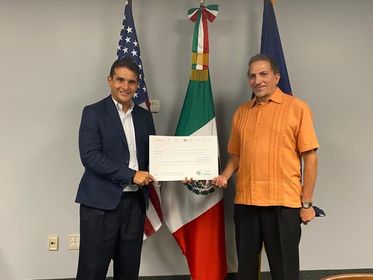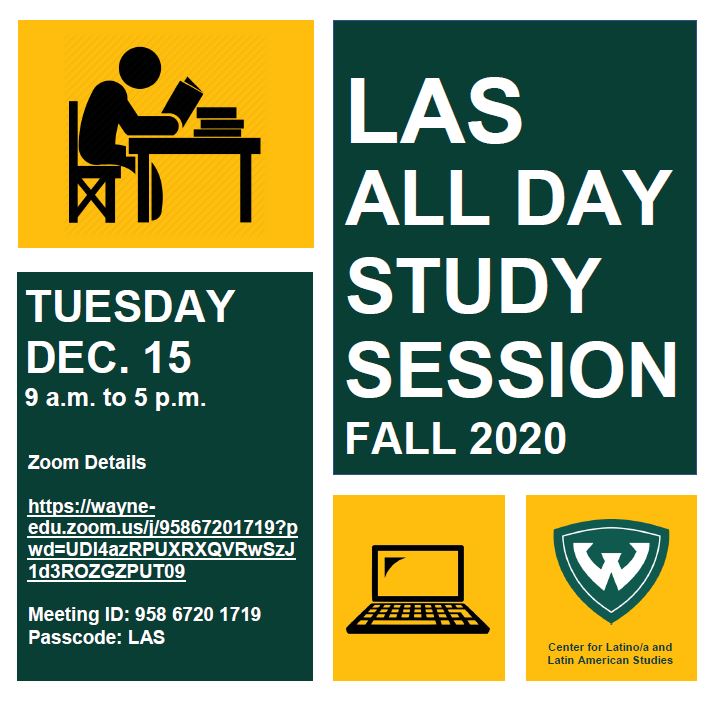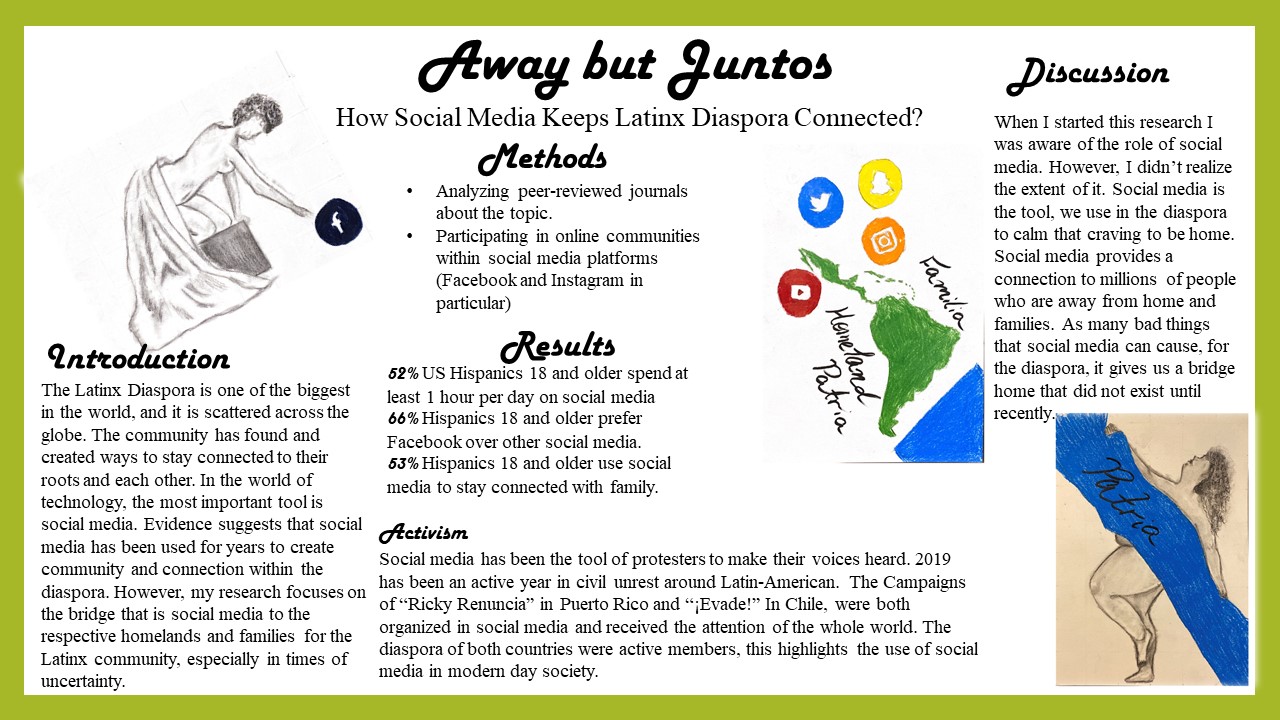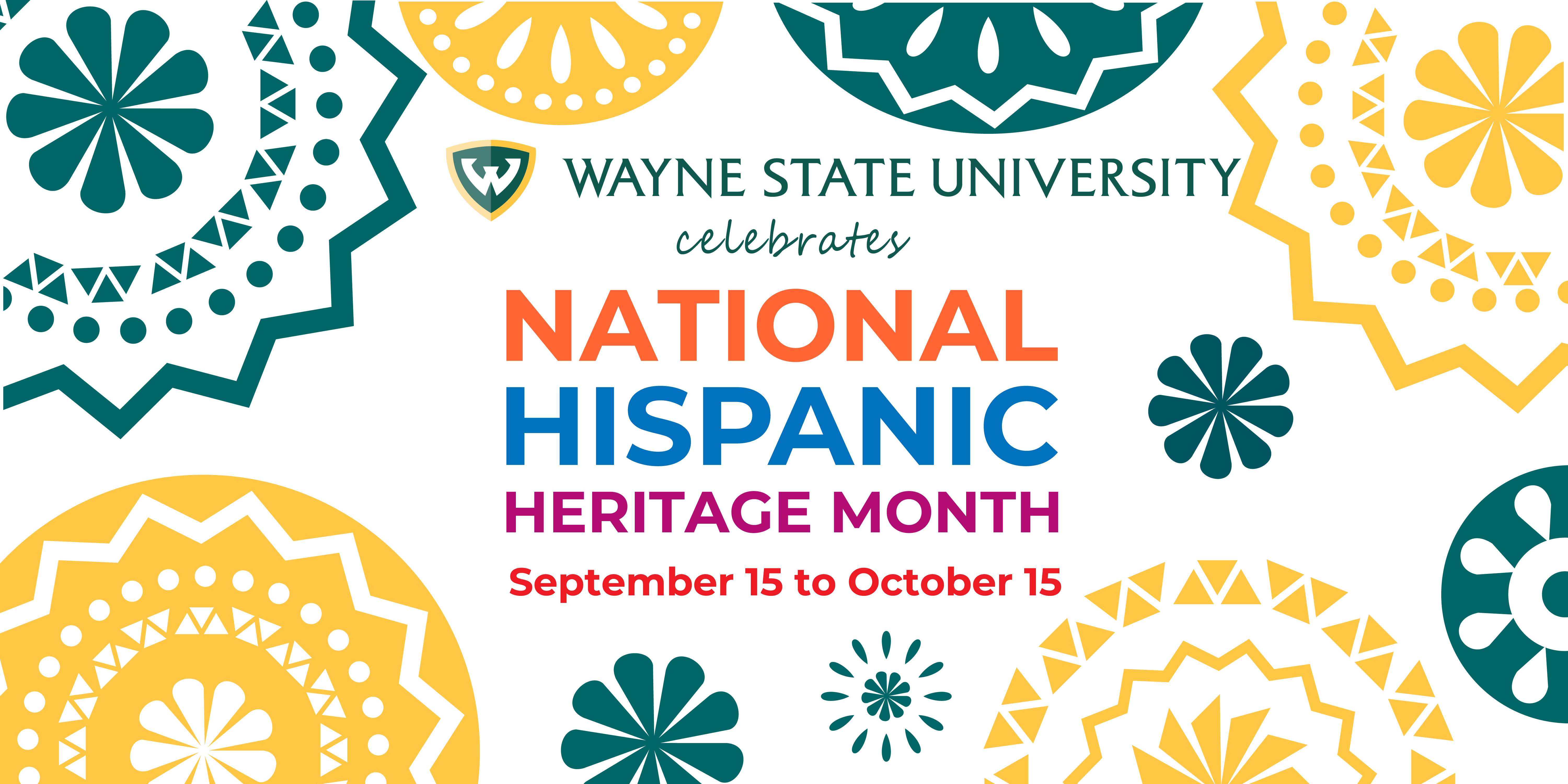COVID-19 Response
2020 has been one of the most challenging in our center's 50-year history. The worldwide COVID-19 pandemic has brought incredible loss and disruption to our university community, with underrepresented students, like those who participate in CLLAS programs, being disproportionately impacted. We are extremely proud, however, that through teamwork and an immense amount of planning, we found creative ways to support and honor the students whom we serve.
This is how we are delivering a mix of academic, research, and professional development opportunities to students during the pandemic.
Scholarships

Consul of Mexico in Detroit.
We cannot overstate the economic devastation that COVID-19 has ushered in for some families. Unemployment has surged across the U.S. due to stay-at-home orders and shutdowns. Many of our students live in households that may not qualify for government assistance due to immigration status. We saw an increase in both the number of hours that our students had to work in service-industry jobs to make up for loss of family income and in requests for financial assistance. At the same time, we had to cancel our annual fundraising dinner, which brings in critical funds for scholarships.
We are pleased to report that through the generosity of alumni and community partners, including the Mexican Consulate in Detroit and DTE Energy Foundation, we were able to support more than 125 students with over $200,000 in direct aid.
Advising and study sessions
 With our students having to balance the stress of an increased workload, pandemic-related mental and physical health challenges, and the adjustment to online learning, our faculty and staff rallied round-the-clock to ensure that each student received proper support. Since transitioning to remote learning in March, our advisors and instructors have spent each day meeting with students, hosting opportunities for virtual engagement, and connecting students with valuable resources to meet academic and personal needsall in addition to their regular staff duties.
With our students having to balance the stress of an increased workload, pandemic-related mental and physical health challenges, and the adjustment to online learning, our faculty and staff rallied round-the-clock to ensure that each student received proper support. Since transitioning to remote learning in March, our advisors and instructors have spent each day meeting with students, hosting opportunities for virtual engagement, and connecting students with valuable resources to meet academic and personal needsall in addition to their regular staff duties.
Our advisors hosted daily virtual walk-in office hours so no student would have to wait to connect with a staff member in real time. Peer mentors held twice-weekly study sessions through Zoom where students could receive individualized tutoring and assistance with assignments. We even monitored more than 1,000 progress reports on CLLAS students, intervening when faculty members had any concerns about student performance. Our goal was to replicate the full array of support services that our center would offer during any other semester, minimizing the number of students who would have to withdraw from a course due to obstacles from online learning.
Virtual research poster board installation
 Despite a radically disrupted semester and having to finish complex work remotely, nearly all of the students enrolled in our LAS 1420: Introduction to Latino/a Studies Research course during the winter 2020 academic term (January April) submitted a final research project. We unfortunately had to postpone our 2020 Academia del Pueblo Latino/a Studies Research Conference; however, we have displayed the students' final projects on our website. These students examined Latinidad through the lens of technology on a diverse range of topics, including governmental surveillance, K-12 education delivery and pop culture. We are incredibly proud of their resilience. You may access their amazing work below.
Despite a radically disrupted semester and having to finish complex work remotely, nearly all of the students enrolled in our LAS 1420: Introduction to Latino/a Studies Research course during the winter 2020 academic term (January April) submitted a final research project. We unfortunately had to postpone our 2020 Academia del Pueblo Latino/a Studies Research Conference; however, we have displayed the students' final projects on our website. These students examined Latinidad through the lens of technology on a diverse range of topics, including governmental surveillance, K-12 education delivery and pop culture. We are incredibly proud of their resilience. You may access their amazing work below.
Virtual Latina/o/x and Native Graduation Celebration
On May 7th, we hosted a live online graduation celebration for more than 40 graduating students. This event was actually the first of its kind to be held by an academic community within Wayne State University and served as a model for other virtual campus celebrations and events. We are grateful to the Latinx Faculty and Staff Association, NDN Learning Community, and the Office of Multicultural Student Engagement for their partnership on this event, which can be screened in its entirety below.
Summer Enrichment Program
Most of the recruitment for our new cohort of students takes place in the spring, once students have been admitted to WSU. Like educational institutions across the country, WSU had to cancel, postpone or modify activities, which significantly impacted recruitment of new students. Despite this, WSU saw its largest class of freshmen students in its history and participation of new students in CLLAS remained strong. We successfully recruited 40 participants for our 2020 Summer Enrichment Program (SEP) cohort.

We modified SEP to a 100% online format, mixing synchronous and asynchronous content. Students took two full WSU courses (Communication 1010 and English 1010) as well as a math mini course and cultural studies workshops that specifically focused on the movement for racial justice. SEP participants also met with a peer mentor (junior or senior-level student) each week and an advisor every couple of weeks to go over program progress and topics related to the upcoming fall semester. Our staff even personally delivered program t-shirts, welcome packages, and in some cases laptops, to each SEP student and mentor to both to encourage a sense of community and ensure they were equipped for success.
Out of the 40 students who enrolled in the program, 37 (93%) completed all requirements. Our newest students are now wrapping up their first full semester at WSU and we are in the midst of recruiting a 2021 cohort.
Community and civic engagement
 Hispanic Heritage Month coincides with the beginning of the fall semester, and for the past few years, the Latinx Faculty and Staff Association (LFSA) has hosted a Latina/o/x Welcome Back Reception in mid-September. The center's assistant director, who is also an officer of LFSA, is the lead coordinator of this event. This year, we partnered with LFSA to celebrate our Latino/a community with an entire series of virtual events, such as a live poetry performance, Latino/a student organization networking, trivia night, dance party and a faculty success panel discussion. We provided support for events hosted by the Latinx Student Association and the Latino Medical Student Association and managed the Hispanic Heritage Month 2020 website and calendar for the campus.
Hispanic Heritage Month coincides with the beginning of the fall semester, and for the past few years, the Latinx Faculty and Staff Association (LFSA) has hosted a Latina/o/x Welcome Back Reception in mid-September. The center's assistant director, who is also an officer of LFSA, is the lead coordinator of this event. This year, we partnered with LFSA to celebrate our Latino/a community with an entire series of virtual events, such as a live poetry performance, Latino/a student organization networking, trivia night, dance party and a faculty success panel discussion. We provided support for events hosted by the Latinx Student Association and the Latino Medical Student Association and managed the Hispanic Heritage Month 2020 website and calendar for the campus.
To ensure that our students had access to information on the upcoming general election and were encouraged to vote, our staff hosted two virtual, non-partisan workshops on voting and published a companion step-by-step guide. Topics included registering to vote, early absentee voting, finding credible sources of information on candidates and proposals, and a special section on judicial elections. Research librarian Ida Martinez created a voting research guide that provided a wealth of information on everything from party platforms to press coverage of local candidates. Finally, on the morning after the election, we hosted a discussion where students could share their post-election thoughts, questions or concerns.
Looking ahead
We anticipate that many challenges of 2020 will continue into the new year, but we remain committed to our mission of serving students and representing our Latino/a community.